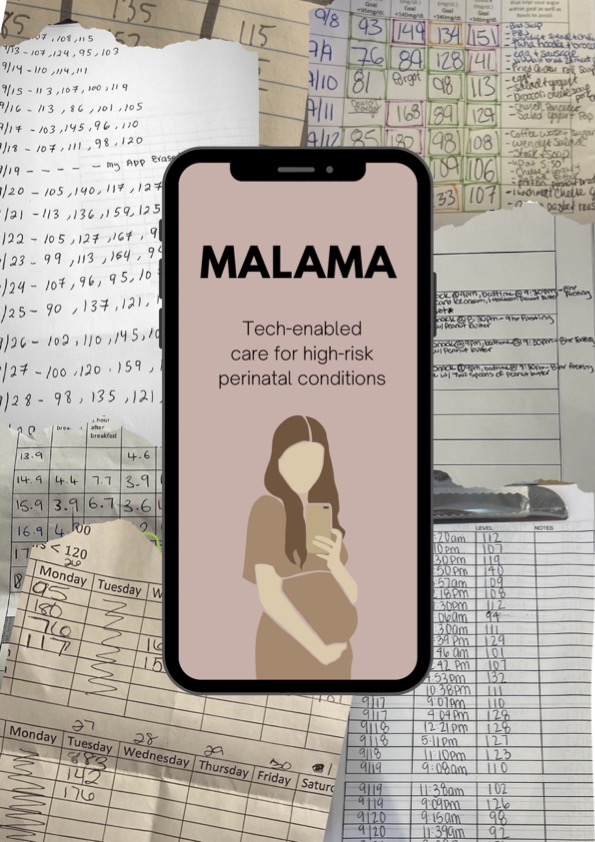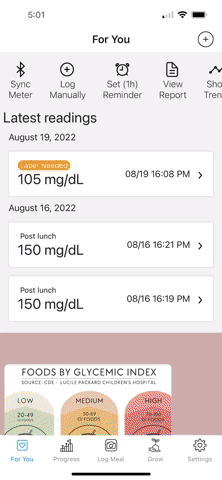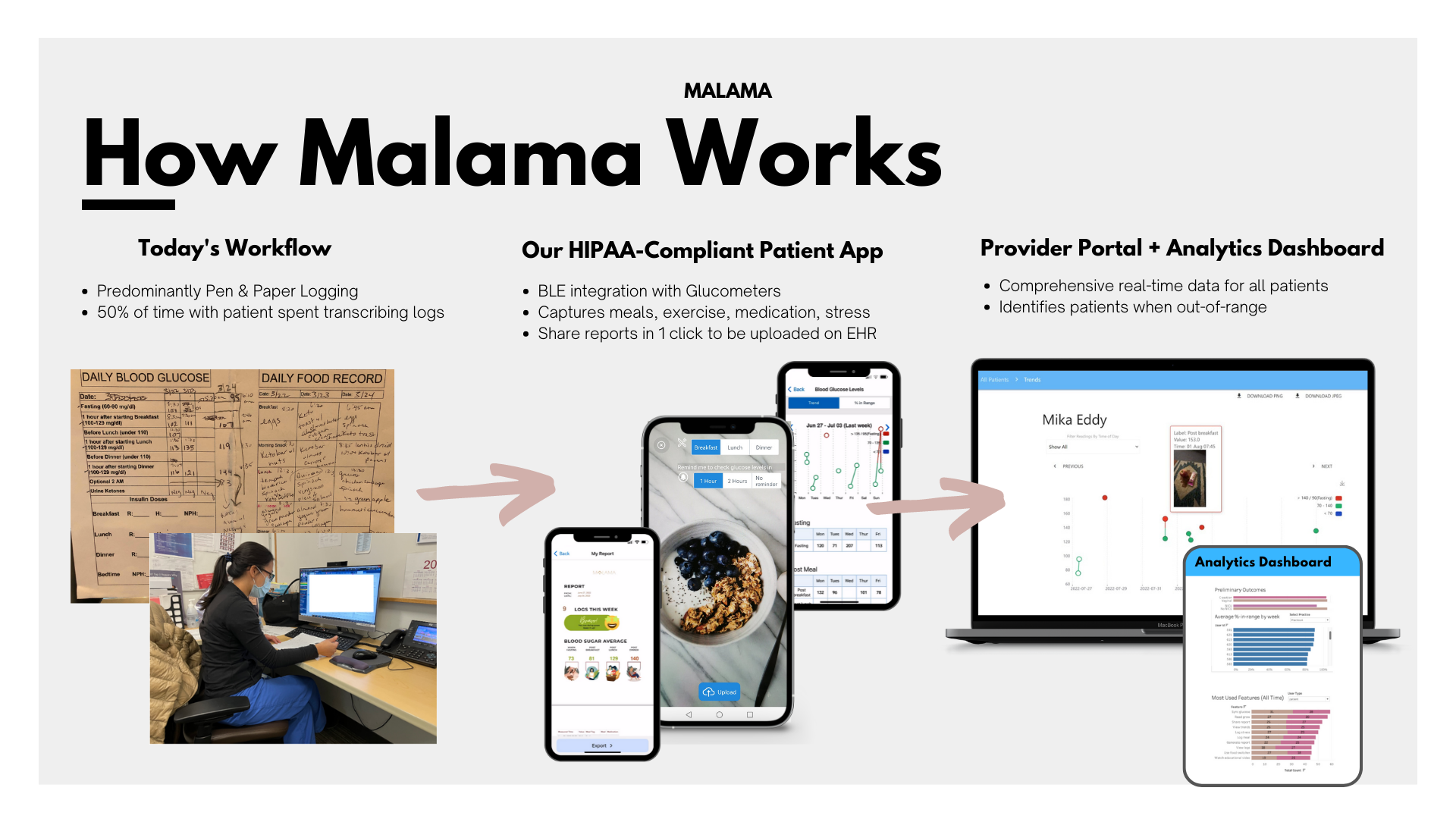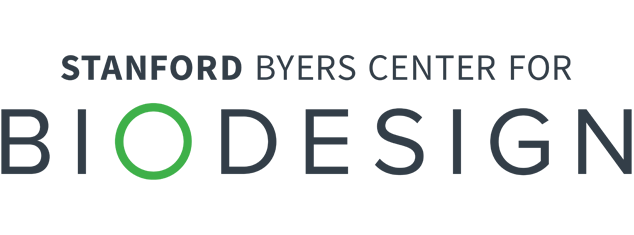Stories
Managing diabetes in pregnancy with a digital app
 The Malama app replaces traditional food logs, making the management of GD more accurate and convenient for pregnant mothers.
The Malama app replaces traditional food logs, making the management of GD more accurate and convenient for pregnant mothers.
Mika Eddy remembers feeling overwhelmed when she was pregnant. Despite keeping an active lifestyle and eating what she considered a healthy diet, she was diagnosed with gestational diabetes (GD), a type of diabetes that affects pregnant women and can lead to complications for both the mother and baby.
Now, just two years later (and with another child on the way), Eddy has a healthy baby boy and leads a company designed to make pregnancy safer and easier for women with GD.
Those with GD need to monitor their meals and measure their blood sugar four times per day, keep track of the numbers, and share them with their doctors and nurses. The information is critical because elevated blood sugar increases the risk of high blood pressure for the mother. It also can result in the baby being born early, or worse, not surviving the pregnancy.
“I was handed a piece of paper and told to log my blood glucose levels and everything I ate four times a day, and to maybe stop eating rice,” Eddy said. “GD is the most common metabolic condition in pregnancy, but it’s still largely tracked with pen and paper.” As many as one in ten pregnant women are diagnosed with this type of diabetes every year—a number that has increased 30 percent between 2016-2020 alone (CDC 2022).
Wanting to help other women with GD, Eddy undertook a project in the Biodesign for Digital Health course when she returned to the Stanford GSB as a Sloan Fellow. This project ultimately led to the founding of a digital health company named Malama, which in the Hawaiian language means “to nurture, take care of, preserve, and protect.”
The first product from Malama Health is a digital app that enables women to more efficiently log their glucose levels and meals, share the data with healthcare providers, and more accurately identify potential food triggers that affect their glucose levels. Available in English and Spanish, the fully HIPAA-compliant app is being tested through a pilot study with the Santa Clara Valley Medical Center. The app has already attracted more than 170 patients and the early results are promising.
 A demonstration of what the user experiences when logging a meal on the Malama app.
A demonstration of what the user experiences when logging a meal on the Malama app.
The Malama team has seen that 85 percent of users who log at least seven times in the first week stick with the app through delivery. This is in part because the more data you log, the more personalized Malama’s insights become. “All you do is take a picture of your meal, and the app gives helpful insights on something you can try whether it’s a food alternative or a quick walk… I’m looking forward to additional insights each time I log [a meal].”
Another user with GDM in her seventh pregnancy loves how easy it is to log and share data. “The app really makes it so much easier to log everything,” she said. “The graph really is useful because it shows my trend over time which helped my OB start me on medication.”
As a Biodesign student, Eddy shadowed physicians in Stanford’s Maternal Fetal Medicine clinic and interviewed the doctors, nurses, and patients to learn more about the stakeholders affected by GD and their needs. She was surprised to find that, even at Stanford Hospital, patients were still being instructed to log their meals and glucose levels with pen and paper. Some patients would bring the paper logs to their doctors, but many would bring in the glucometer or recite data from their notes app. Others forgot their logs completely, making it difficult for doctors to prescribe or alter medication.
Shalmali Sunil Bane, a PhD candidate in epidemiology and clinical research, met Eddy the following quarter in Stanford d.school’s spring Launchpad Accelerator.
“As a maternal health and disparities researcher, it is glaringly obvious how overlooked pregnancy is in health research,” Bane said. “When Mika told me about Malama, I jumped at the opportunity to work on a solution, especially in a condition like gestational diabetes that disproportionately impacts minoritized populations.”
Eddy and Bane recruited Orlando Li, an engineer who had worked at Airbnb, and Daniela Bahamon Arango, another GSB Sloan Fellow who had led her own design company, to join Malama, as well.
Together, the team created the app with the goal of addressing the administrative burden patients face, while also providing them with actionable data, insights, and personalized recommendations for managing their health. The team was committed to creating a product women could download, sync to their glucometer, and begin storing and sharing the critical data by tapping on their phone.
Forty women agreed to serve as beta testers and, thanks in part to their feedback, the Malama team was able to improve the app so that it could detect ingredients in meals, sync to Medi-Cal glucometers over Bluetooth, and populate a dashboard so doctors and nurses could monitor their patients in real time.
Through the pilot study with Santa Clara Valley Medical, approximately 50 patients will begin using Malama by the end of 2022. Andrea Jelks, an Ob-Gyn who is the director of research in Santa Clara Valley’s maternal fetal medicine division, is overseeing the trial. Three of her nurse practitioners attended the kickoff, including Sharon Castellanos, who loved the provider dashboard.
“This is where I can teach our patients what is going on with their body,” Castellanos said. “I like how the graphs help you quickly identify whether it’s a diet-related issue or insulin resistance.”
 A step-by-step guide to how the app works.
A step-by-step guide to how the app works.
Women and women’s health remain underserved by current technologies, so Eddy and her team are already plotting next steps and next projects. And they’re thinking big. Among their plans is a clinical study with Tufts Medical to demonstrate how the app increases logging compliance and decreases the risk of adverse clinical events, like C-sections and preterm birth, resulting in significant cost savings. “At Malama, we're disrupting the $20 billion fem tech market to improve pregnancy related outcomes and help all women live healthier lives from preconception through postpartum and beyond,” Eddy said.
Mika Eddy studied Human Biology at Stanford. She spent a year in China as a Fulbright Scholar working with Stanford’s Rural Action Program to evaluate quality of care in rural and urban clinics, then worked with start-ups and established companies delivering innovative products in health care. In 2021, Eddy returned to Stanford as a Sloan Fellow in the Graduate School of Business before founding Malama Health.
